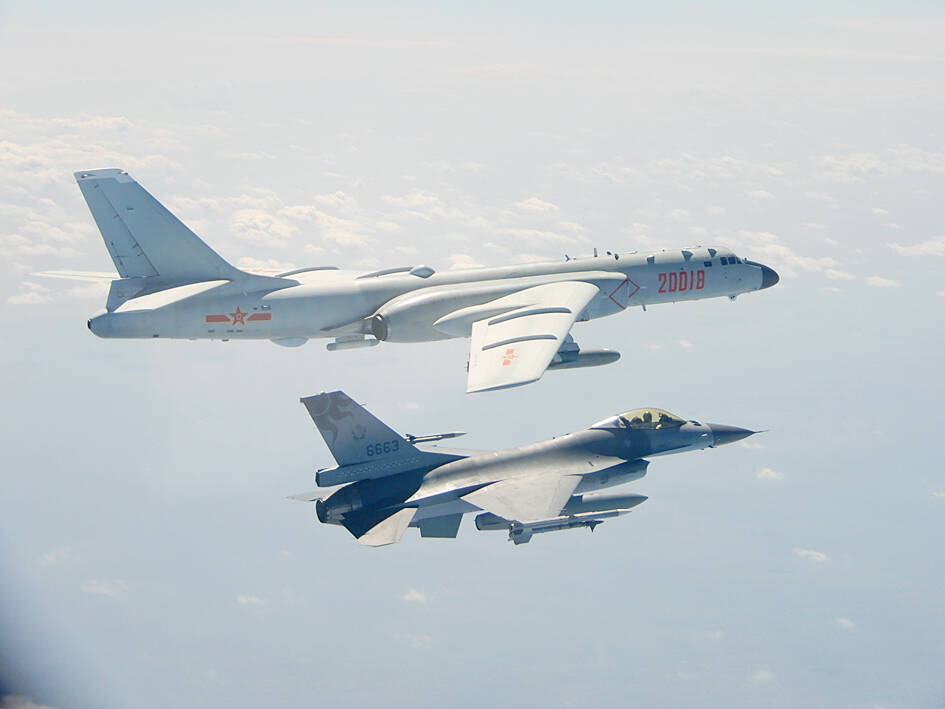Chinese warplane incursions into Taiwan’s air defense identification zone nearly doubled last year, with a surge in fighter jet and bomber sorties as Beijing intensified threats toward the nation.
Relations have been icy for years under Chinese President Xi Jinping (習近平), but last year saw a deeper deterioration, as Xi’s military ramped up incursions and launched the largest war games in decades to protest against a visit by US House of Representatives Speaker Nancy Pelosi in August.
China sent 1,727 planes into Taiwan’s air defense identification zone last year, according to a database based on daily updates released by the Ministry of National Defense.

Photo: EPA-EFE / Ministry of National Defense
That compares with about 960 incursions in 2021 and 380 in 2020.
Fighter jet sorties more than doubled from 538 in 2021 to 1,241 last year, while incursions by bombers, including the nuclear-capable H6, increased from 60 to 101.
Last year also witnessed the first incursions by drones, with all 71 reported by the military coming after Pelosi’s visit.
Military analysts say China has used the incursions to probe Taiwan’s defenses, exhaust its aging air force and voice displeasure over US support for Taipei.
The Chinese “want to show their determination, their will and to coerce the United States: don’t get too close to their red lines, don’t cross their red lines,” former chief of the general staff Admiral Lee Hsi-ming (李喜明) said.
The US recognizes China over Taiwan diplomatically, but remains Taipei’s most important ally.
It opposes any forced change to Taiwan’s status and is bound by the Taiwan Relations Act to supply the nation with the means to defend itself.
Support for Taiwan is a rare issue of bipartisan consensus in Washington and there has been growing alarm over whether China might resort to a military solution, a fear heightened by Russia’s invasion of Ukraine.
Washington has maintained a policy of “strategic ambiguity” toward Taiwan, deliberately making no firm commitment on whether it would come to its defense.
That strategy was aimed at making Beijing think twice about the costs of any invasion, and also to deter Taiwan from formally declaring independence.
US President Joe Biden has been mercurial on the issue of strategic ambiguity.
He has repeatedly said US troops would come to Taiwan’s aid in the event of a Chinese invasion, only for the White House to walk back his comments.
China has used warplane incursions to voice its displeasure about specific events. It sent 71 warplanes to conduct a “strike exercise” on Dec. 25 in response to what it described as “escalating collusion and provocations” by Washington and Taipei.
That came days after Biden signed off on up to US$10 billion in military aid to Taiwan.
August saw a record 440 sorties by Chinese warplanes, the same month Pelosi became the highest-ranking US lawmaker to visit Taiwan in 25 years.

SECURITY: As China is ‘reshaping’ Hong Kong’s population, Taiwan must raise the eligibility threshold for applications from Hong Kongers, Chiu Chui-cheng said When Hong Kong and Macau citizens apply for residency in Taiwan, it would be under a new category that includes a “national security observation period,” Mainland Affairs Council (MAC) Minister Chiu Chui-cheng (邱垂正) said yesterday. President William Lai (賴清德) on March 13 announced 17 strategies to counter China’s aggression toward Taiwan, including incorporating national security considerations into the review process for residency applications from Hong Kong and Macau citizens. The situation in Hong Kong is constantly changing, Chiu said to media yesterday on the sidelines of the Taipei Technology Run hosted by the Taipei Neihu Technology Park Development Association. With

CARROT AND STICK: While unrelenting in its military threats, China attracted nearly 40,000 Taiwanese to over 400 business events last year Nearly 40,000 Taiwanese last year joined industry events in China, such as conferences and trade fairs, supported by the Chinese government, a study showed yesterday, as Beijing ramps up a charm offensive toward Taipei alongside military pressure. China has long taken a carrot-and-stick approach to Taiwan, threatening it with the prospect of military action while reaching out to those it believes are amenable to Beijing’s point of view. Taiwanese security officials are wary of what they see as Beijing’s influence campaigns to sway public opinion after Taipei and Beijing gradually resumed travel links halted by the COVID-19 pandemic, but the scale of

A US Marine Corps regiment equipped with Naval Strike Missiles (NSM) is set to participate in the upcoming Balikatan 25 exercise in the Luzon Strait, marking the system’s first-ever deployment in the Philippines. US and Philippine officials have separately confirmed that the Navy Marine Expeditionary Ship Interdiction System (NMESIS) — the mobile launch platform for the Naval Strike Missile — would take part in the joint exercise. The missiles are being deployed to “a strategic first island chain chokepoint” in the waters between Taiwan proper and the Philippines, US-based Naval News reported. “The Luzon Strait and Bashi Channel represent a critical access

Pope Francis is be laid to rest on Saturday after lying in state for three days in St Peter’s Basilica, where the faithful are expected to flock to pay their respects to history’s first Latin American pontiff. The cardinals met yesterday in the Vatican’s synod hall to chart the next steps before a conclave begins to choose Francis’ successor, as condolences poured in from around the world. According to current norms, the conclave must begin between May 5 and 10. The cardinals set the funeral for Saturday at 10am in St Peter’s Square, to be celebrated by the dean of the College